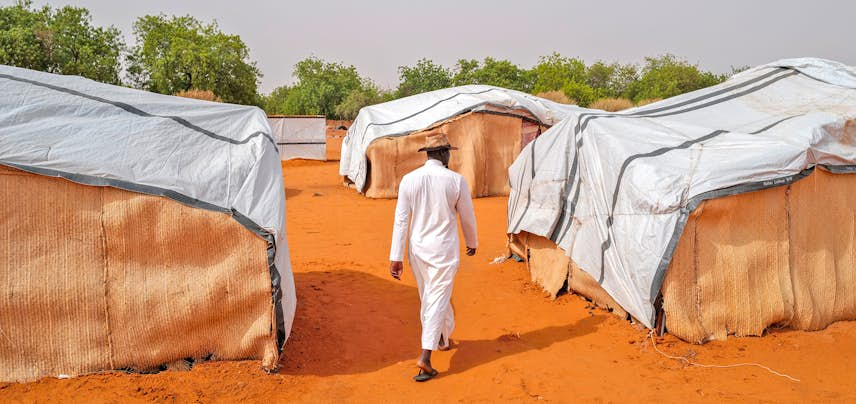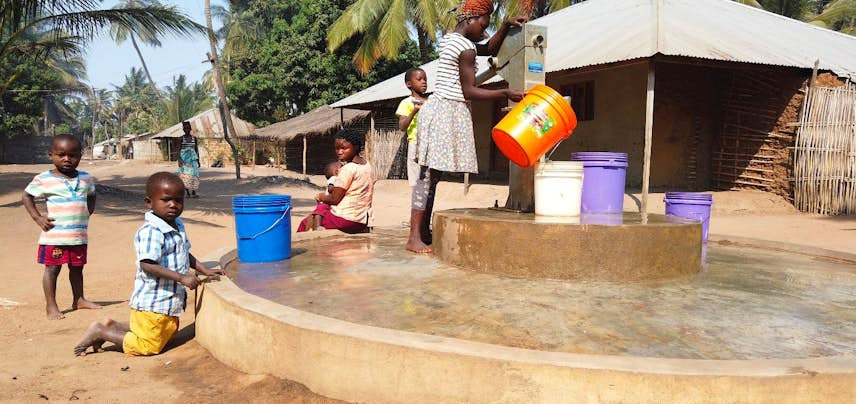Introduction
The COVID-19 pandemic continued to be a major threat to vulnerable populations dependent on humanitarian action throughout the year, with a major impact in areas where health systems are dysfunctional. Thanks to a budget increase at the end of the year, Luxembourg’s humanitarian action was able to step up its efforts to increase its support in the most urgent or under-funded humanitarian contexts.
Aide humanitaire par pays
In 2021 Luxembourg further strengthened its network of select partnerships. The humanitarian affairs department has thus prepared five new strategic partnership frameworks with the following humanitarian organisations: the International Committee of the Red Cross (ICRC), the Office of the United Nations High Commissioner for Refugees (UNHCR), the World Food Programme (WFP), the Office for the Coordination of Humanitarian Affairs (OCHA) and the United Nations Office for Disaster Risk Reduction (UNDRR). These agreements will enter into force on 1 January 2022 for a period of four years and will give even more predictability in terms of funding to these bodies, in line with our commitment in the framework of the Grand Bargain, one of the main outcomes of the 2016 World Humanitarian Summit. The year 2021 also saw the start of Luxembourg’s co-presidency of the ICRC’s Donor Support Group. It will culminate in 2022 with the organisation of the annual meeting in Luxembourg.
In addition, on 28 June 2021 Minister Fayot delivered the opening speech at the launch event for a set of research reports funded by Luxembourg and produced by the International Center for Transitional Justice (ICTJ) on transitional justice and prevention. A discussion then took place in July 2021 between Franz Fayot and Fernando Travesi, Executive Director of the ICTJ, which led to the signing of a new partnership agreement to strengthen ICTJ transitional justice programmes, notably in Colombia, East Africa and Tunisia.
Despite the pandemic, the annual financial envelopes for humanitarian NGOs have been maintained at the level of previous years. The department also continued to place more emphasis on its discussions with humanitarian NGOs present in Luxembourg within the framework of a structured dialogue. In 2021, one of the innovations was the introduction of new quality control procedures and a new reporting system (8+3 template), with the aim of harmonising our quality standards with those of the international humanitarian community. Finally, the humanitarian affairs department has also made use of the external assigned revenues instrument of the European Commission’s Directorate-General for European Civil Protection and Humanitarian Aid Operations (ECHO) on two occasions, in the context of the crises in Myanmar and Central America. This instrument facilitates greater involvement in the Team Europe approach and in the practical implementation of joint programming commitments in order to strengthen aid effectiveness.
Through a collective effort by the Directorate for Development Cooperation and Humanitarian Affairs, a first pilot version of the new humanitarian action strategy was finalised at the end of the year. This strategy will make it possible to better formulate the strategic and thematic cross-cutting focuses of Luxembourg’s humanitarian action and more closely follow up its activities, by means of specific objectives. The document, to be published in early 2022, will enable the MFA to address unprecedented humanitarian needs and support the humanitarian system, which Martin Griffiths says “is being stretched to its limits.”
In view of the complexity of the crises and the worsening humanitarian situation, in 2021 the Sahel remained the priority region for Luxembourg’s humanitarian action. In conflict-affected areas, civilians have faced an increasingly serious protection crisis. In Burkina Faso, millions of people have had to flee their homes as violence has intensified in different parts of the country. The crisis in Syria and the impact of this protracted conflict on the region, the Rohingya refugee crisis in Bangladesh, the conflicts in Ethiopia and Afghanistan and the conflict in Yemen, which has been ravaging the country since 2014, were once again priority areas.
In addition, Luxembourg’s humanitarian response provided support in 2021 in other fragile and complex contexts, too often overlooked by the donor community, including the Central African Republic, Colombia, the Democratic Republic of the Congo, Nigeria, Palestine, the Philippines, Somalia, South Sudan, Ukraine and Venezuela. Finally, on the humanitarian front, 2021 also saw the earthquake in Haiti in August, the disastrous impact of Typhoon Rai/Odette in the Philippines and the migration crisis in Central America.
On 8 September 2021, Minister Fayot met with Alain Délétroz, Director General of the NGO Geneva Call, in Luxembourg. In particular, the discussion was an opportunity to stress the importance attached by Luxembourg to the relatively new but high-quality partnership with Geneva Call, especially in Mali, and to discuss possibilities for enhanced collaboration in the coming years and the areas in which the NGO operates, including Afghanistan, Colombia, Mali and Ukraine.
At the International Federation of Red Cross and Red Crescent Societies (IFRC)’s Disaster Relief Emergency Fund (DREF) Pledging Conference, held on 18 October 2021, Franz Fayot announced that Luxembourg would contribute EUR 500 000 to DREF in 2021.
During his working visit to Jordan from 14 to 16 September 2021, Minister Fayot was able to visit several ongoing projects and operations, including the Azraq Syrian refugee camp and a Palestinian refugee camp in Amman. The ministerial visit sought specifically to engage in dialogue with key partners of Luxembourg’s humanitarian action active in the Middle East region. For example, the minister was able to hold discussions with UNHCR officials in Jordan, the United Nations Resident Coordinator in Jordan, the Representative of the European Union in Jordan and the Commissioner-General of UNRWA.
On 8 December 2021, Minister Fayot participated in the high-level virtual conference to announce pledges for the Central Emergency Response Fund (CERF), organised by the United Nations Office for the Coordination of Humanitarian Affairs (OCHA), at which he announced Luxembourg’s intention to maintain its financial support for CERF in 2023 and 2024 at the same level as for the period 2021 – 2022, with a sum of EUR 10 million spread over two years (EUR 5 million per year). Through CERF, Luxembourg’s humanitarian action therefore supports not only urgent crises but also prolonged and “forgotten” crises. During his visit to New York, Minister Fayot also held discussions with Martin Griffiths, United Nations Under-Secretary-General for Humanitarian Affairs and Emergency Relief Coordinator.

